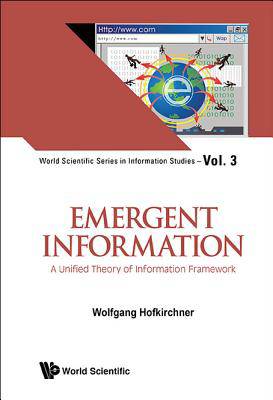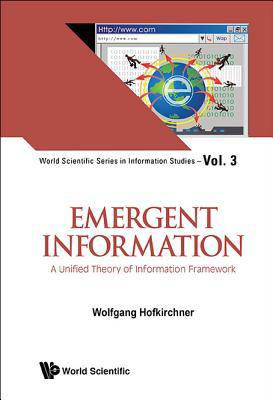
- Afhalen na 1 uur in een winkel met voorraad
- Gratis thuislevering in België vanaf € 30
- Ruim aanbod met 7 miljoen producten
- Afhalen na 1 uur in een winkel met voorraad
- Gratis thuislevering in België vanaf € 30
- Ruim aanbod met 7 miljoen producten
Zoeken
Emergent Information: A Unified Theory of Information Framework
Wolfgang Hofkirchner
€ 160,45
+ 320 punten
Omschrijving
At the dawn of the information age, a proper understanding of information and how it relates to matter and energy is of utmost importance for the survival of civilisation. Yet, attempts to reconcile information concepts underlying science and technology with those en vogue in social science, humanities, and arts are rather rare. This book offers a new approach, departing from fragmented information concepts.Many academics refrain from undergoing unifications, as most undertakings are reductionistic. This book contends that it is the noble task of an as-yet-to-be-developed science of information to go one step in the direction of a unified theory of information without falling back into neither reduction nor anthropomorphisation.To be able to succeed in an ambitious task like this, the book advocates the application of complex systems theory and its philosophical underpinnings. Information needs to be interpreted in terms of self-organisation to do justice to the richness of its manifestations. The way the book does so will provide the reader with a deep insight into a basic feature of our world.The following are discussed in the volume: A Science of Information; A New Way of Thinking; Praxio-Onto-Epistemology; Evolutionary Systems Design; Evolutionary Systems Ontology; Evolutionary Systems Methodology; Capurro's Information Concept Trilemma; A Multi-Stage Model of Evolutionary Types of Information: Pattern Formation, Code-Making, and Constituting Sense; A Triple-C Model of Systemic Functions of Information: Cognising, Communicating, and Co-Operating; Nine Categories of Information Capabilities: Reflectivity (physical), Psyche (biotic), Consciousness (human); Connectivity (physical), Signalability (biotic), Languageability (human); Cohesiveness (physical), Coherency (biotic), Communitarity (human); Nine Categories of Information: Response (physical), Flexible Response (biotic), Reflexion (human); Correspondences (physical), Signals (biotic), Symbolic Acts (human); Assemblage (physical), Assignment (biotic), Association (human); A Unified Theory of Information for, about, and by means of the Information Society.
Specificaties
Betrokkenen
- Auteur(s):
- Uitgeverij:
Inhoud
- Aantal bladzijden:
- 292
- Taal:
- Engels
- Reeks:
- Reeksnummer:
- nr. 3
Eigenschappen
- Productcode (EAN):
- 9789814313483
- Verschijningsdatum:
- 1/02/2013
- Uitvoering:
- Hardcover
- Formaat:
- Genaaid
- Afmetingen:
- 155 mm x 236 mm
- Gewicht:
- 553 g

Alleen bij Standaard Boekhandel
+ 320 punten op je klantenkaart van Standaard Boekhandel
Beoordelingen
We publiceren alleen reviews die voldoen aan de voorwaarden voor reviews. Bekijk onze voorwaarden voor reviews.











